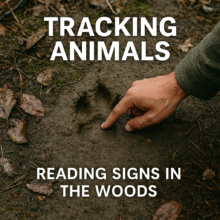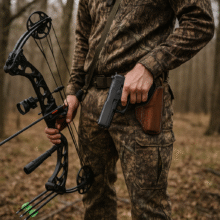Fair Chase Hunting: A Deep Dive into Sustainable Practices

Table of Contents
Introduction
Initiation into the Journey
Embark on a journey through time and explore the intricate world of fair chase hunting. Initially, we will unravel the rich tapestry of its history and gradually navigate the nuances of modern practices.
Section 1: History Unveiled
Historical Overview
- From Ancient Roots Begin by tracing the footsteps of ancient hunters. Here, we delve deeply into the evolving practices over the centuries, moving seamlessly to the present era.
- Movement and Mentors Subsequently, we turn our focus to prominent figures and movements. These pivotal elements shaped fair chase hunting, crafting its modern identity.
- Modern Transition Finally, in this section, we bridge the gap between traditional methods and present-day principles, painting a vivid picture of the transition.
Philosophical Grounds
- Ethics and Morality Furthermore, we explore the moral compass guiding hunters. This section analyzes the respect and reverence that underline the ethical hunting practice.
- Societal Shifts Likewise, we evaluate societal perspectives. Over time, views on hunting have transformed significantly, warranting a closer look.
- Modern Discourses Consequently, we dive into present-day discussions that encapsulate philosophical debates, offering readers a glimpse into contemporary dialogues.
Section 2: In-depth Analysis of Principles
Principle Definitions
- Wildlife Respect Additionally, we examine the deep connection between hunters and wildlife, illustrating the sanctity of this relationship.
- Balanced Harvesting Moreover, this segment scrutinizes the balanced approach advocated by fair chase principles, promising sustainability and ethical harvesting.
- Skill and Knowledge Pursuit Similarly, we elaborate on the skills and knowledge that are essential for a hunter, portraying the detailed artistry involved in fair chase hunting.
Adapting to Different Environments
- Habitat Understanding Hence, we guide readers through various habitats, depicting their influential role in shaping fair chase hunting practices.
- Impact of Seasonal Variations Furthermore, we analyze the impact of seasonal changes on hunting strategies, providing detailed insights into this aspect.
- Weather Patterns Consequently, this segment explores the role weather patterns play, highlighting their significance in determining hunting strategies.
Section 3: Your Guide to Fair Chase Hunting
Before the Hunt
- Research and Planning Initially, we discuss the role of meticulous planning and research, outlining their critical roles in a successful hunt.
- Understanding Regulations Additionally, this section navigates through legal frameworks and necessary licenses, preparing prospective hunters for the journey ahead.
- Mastery Over Equipment Subsequently, we shift our focus to equipment handling, emphasizing the importance of skill and expertise in this domain.
During the Hunt
- Skill Application Moreover, we detail the application of skill and patience, portraying hunting as both a craft and a sport.
- Ethical Considerations Hence, this segment dives deep into the moral considerations that govern a hunt, transcending mere rules and engaging in a rich moral dialogue.
- Boundary Respect Similarly, we discuss the vital aspect of recognizing and respecting boundaries during the hunt, fostering a harmonious interaction with nature.
After the Hunt
- Ethical Disposal Additionally, we describe responsible methods to manage the harvest, advocating respect and sustainability in practice.
- Community Bonding Furthermore, we touch upon the communal aspects of hunting, emphasizing the joy of sharing the bounty and fostering community bonds.
- Learning and Reflecting Finally, we dive into the learning journey each hunting expedition offers, focusing on personal growth and the evolution of a hunter.
Section 4: Benefits Explored
Ecological Advantages
- Conservation Efforts Here, we examine the contribution of fair chase hunting to conservation initiatives, depicting its role in fostering sustainability.
- Biodiversity Protection Furthermore, we explore hunting’s role in safeguarding biodiversity and habitats, highlighting its contribution to preserving natural ecosystems.
- Facilitating Research Consequently, we discuss the contributions of fair chase hunting in scientific research, providing invaluable data for wildlife management and conservation.
Societal Gains
- Community Engagement Moreover, we discuss hunting’s positive influence on community engagements and its substantial economic contributions.
- Educational Initiatives Additionally, we explore educational avenues, focusing on campaigns that foster awareness and responsible hunting.
- Fostering Nature Relationship Finally, in this section, we talk about the deeper connections developed with nature, resulting from responsible and respectful hunting practices.
Section 5: Challenges Addressed
Critiques Addressed
- Ethical Debates Initially, we engage readers in an intense discussion, presenting various perspectives surrounding the ethical debates in hunting.
- Alternative Strategies Subsequently, we examine alternative conservation methods, analyzing their effectiveness in comparison to hunting practices.
- Maintaining Balance Consequently, we discuss the delicate balance that exists between recreation and conservation, fostering a dialogue on sustainable practices.
Future Prospects
- Emerging Trends Moreover, we take a closer look at emerging trends in fair chase hunting, predicting the trajectory of future developments.
- Policy Developments Furthermore, we delve into the potential policy developments, presenting a detailed roadmap for the future of fair chase hunting.
- Community Roles Finally, we explore the roles individuals can play in promoting fair chase hunting, encouraging community collaborations and initiatives.
Conclusion
Looking Ahead
Envision a sustainable future for hunting, fostering a community that encourages responsible and ethical practices.
FAQs
- What is the core of Fair Chase Hunting?
Ans. The core is grounded in sustainable, ethical, and responsible practices, prioritizing wildlife welfare and environmental conservation. - Why is Fair Chase Hunting a current hot topic?
Ans. Increasing wildlife conservation concerns have brought fair chase hunting to the limelight, promoting a balance between recreation and responsible practices. - How can one transition to Fair Chase Hunting?
Ans. A transition involves adopting ethical practices, enhancing skills, and understanding the delicate balance in wildlife ecosystems. - Are community initiatives promoting Fair Chase Hunting?
Ans. Yes, several initiatives focus on promoting fair chase hunting, encouraging education, awareness, and fostering a community of responsible hunters. - What positive contributions does this type of hunting bring to society?
Ans. It fosters community bonding, economic contributions, educational initiatives, and deeper connections with nature. - What future developments are anticipated in Fair Chase Hunting?
Ans. The future promises a harmonious balance between hunters and nature, focusing on sustainability, ethics, and fostering a deeper understanding and respect for wildlife habitats.







